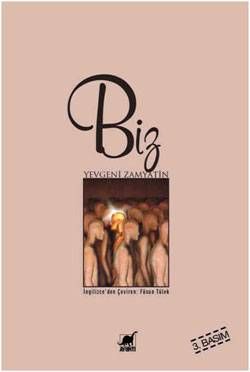
We
G. Zamyatin, who was the pioneer and source of inspiration for writers such as Orwell and A. Huxley, pointed out the danger of totalitarianism in We, which he wrote long before them, and turned anti-utopia into a weapon of radical criticism. Zamyatin, who is against a complete, finished society, describes the negativities of such a society in We. In the novel, which takes place in the 26th century, man has been separated from nature and his own "I" and surrendered to technology and the bureaucratic state by becoming "We". There is no personality... People have numbers, not names. Every minute of the people living behind transparent glass walls is determined and monitored by the state. Male and female numbers have the right to lower the curtains only when they visit each other during the lovemaking hours predetermined by their permission slips. Zamyatin opposed official views, arguing that "real literature can only be realized by contrary and rebellious people, crazy people and dreamers, not by reliable and diligent officials" and became one of the most radical names of his generation.
Big Brother promises neither freedom nor happiness to people; There is no salvation for anyone. The argument brought by Zamyatin is that freedom and happiness are identical concepts for the person who thinks and dreams. (...) Freedom does not have to be pregnant with unhappiness, according to Zamyatin. Although it is painful to rebel and fight against the usual, it is more difficult to live as "yesterday is today and today is yesterday". Zamyatin's utopia is an uninterrupted struggle; A struggle that continues by always looking at today through the eyes of tomorrow, and by destroying what it has established itself, from the moment it begins to become institutionalized. Utopia is a horizon for Zamyatin; it is constantly approached but not reached. "We have arrived" means surrender, the real questions are "Why" and "So what will happen next?".
From Bülent Somay, 1988 / Foreword
Thin Cover:
Number of Pages: 208
Printing Year: < /b>2010
Language: Turkish
Publisher: Ayrinti Publications
First Printing Year: 2010
Number of Pages: 208
Language: Turkish
| Publisher | : | Details Publications |
| Number of pages | : | 208 |
| Publication Year | : | 2017 |
| ISBN | : | 9789755391243 |
| Translator | : | Füsun Tülek |
| The heart | : | Turkish |


